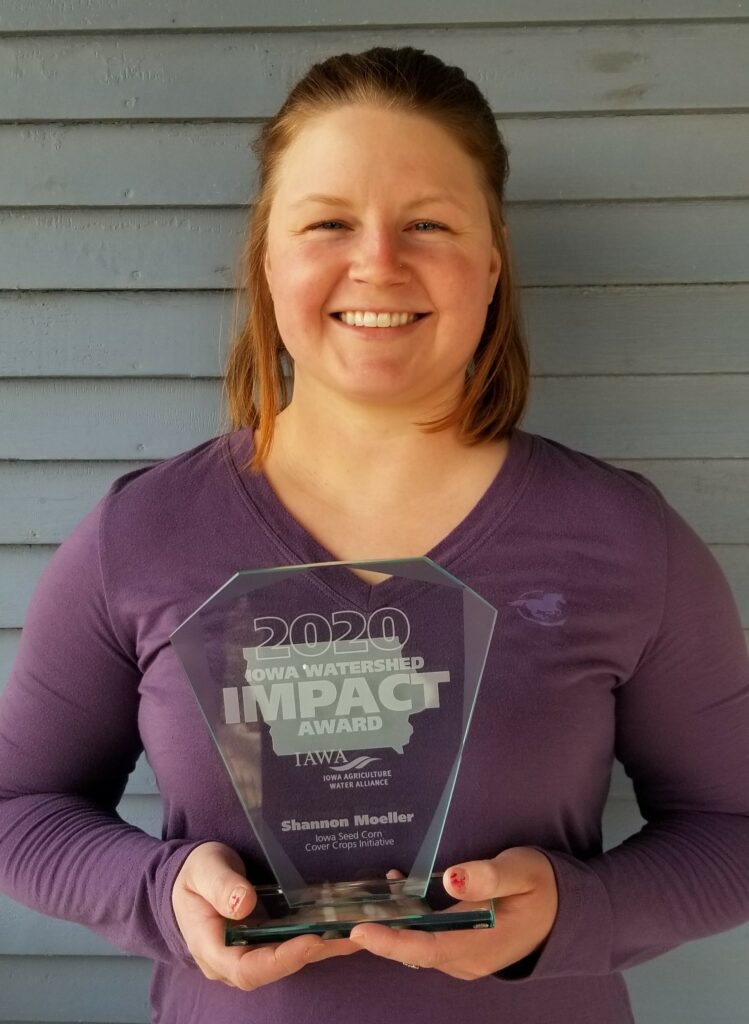





Shannon Moeller, the project coordinator for the Iowa Seed Corn Cover Crop Initiative, is honored with the new Impact award from the Iowa Agriculture Water Alliance (IAWA) as part of the third annual Iowa Watershed Awards program.
Moeller was honored with five other watershed coordinators for their multitude of contributions and steadfast dedication to improving water quality across the state.
Moeller is currently helping Iowa seed corn producers adopt cover crops while also simultaneously advancing the objectives of the statewide Iowa Nutrient Reduction Strategy (NRS) through the
Iowa Seed Corn Cover Crops Initiative.
Before handling this cover crops project with seed corn growers, Moeller was the project coordinator for the Benton/Tama nutrient reduction watershed project.
“Working with farmers and landowners to adopt conservation practices that improve water quality across Benton and Tama counties was a great experience for my current project with the Iowa Seed Association (ISA),” she says. “Helping seed corn growers use cover crops across the entire state is very rewarding.”
Since this project began in 2016, Moeller has worked with seed companies to educate and encourage farmers to seed cover crops following seed field harvest. “Before this project began, only 5 to 10% of seed corn acres in the state had cover crops. In 2019, I worked with over 200 growers in the program covering 30% of Iowa’s seed acres, with some areas close to 75%,” she says.
In addition, more than 50 growers have expanded cover crop use on their commercial corn (non-seed corn) acres, which also helps to meet the goals of the Iowa NRS, she adds.
In 2019, ISA and the Iowa Seed Corn Cover Crop Initiative partnered with the Iowa Ag Radio Network to co-host a series of field days for the Row Crop Run in the summer and fall. Moeller, through her efforts at field days and seed meetings, has made a big difference in helping farmers understand the soil health and water quality benefits provided by cover crops. She shares that growers get excited when they see visible improvements in soil structure, as well as less erosion and runoff.
“After four years, it’s exciting for me to share the successes and challenges, from farmer to farmer,” she says. “So many farmers are now calling me for advice, which is an honor and a privilege.”
Success doesn’t stop there, as Moeller says she retains almost 100% of growers to continue growing cover crops year after year. “They are switching from basic covers like oats that winter-kill to more winter-hardy species like cereal rye and other seed blends designed to improve soil organic matter and water infiltration faster,” she says.
Partnership invaluable
Moeller is quick to point out the value of partnerships and mentors that help drive program success. “I pride myself in developing field days with value, and that includes talks by experienced cover crop farmers, along with involvement from local watersheds, NRCS, Iowa State University (ISU) Extension and Outreach, Practical Farmers of Iowa, Iowa Learning Farms, the Iowa Agriculture Water Alliance, Soil Health Partnership, and many others,” she says.
The Iowa Seed Association developed the Iowa Seed Corn Cover Crop Initiative project in conjunction with the Agribusiness Association of Iowa, Iowa Farm Bureau Federation, and Iowa Corn. A grant from the Iowa Department of Agriculture and Land Stewardship (IDALS) under their Clean Water Iowa Initiative provides funding for the project. Some seed companies also provide cover crops cost-share assistance.
To help maintain momentum for her work, Moeller will receive funding through the Iowa Watershed Award to apply to the Iowa Seed Corn Cover Crop Initiative, as well as funding for her own professional development. She recently added to her ISU Agronomy degree by becoming a Certified Crop Adviser in 2019, with the goal to never stop learning.
The Iowa Seed Corn Cover Crops Initiative focuses on ways to help increase the adoption of cover crops specifically within the seed corn production system in Iowa. The focus on seed corn is driven by the unique opportunity that seed corn provides due to the earlier harvest, thereby providing better timing opportunities for establishing cover crops in the late summer and fall after harvest. This focus is also heavily driven by the seed corn industry in Iowa, and their efforts to help promote and support the use of cover crops as part of Iowa’s Nutrient Strategy.
Find out how you can become a part of the Initiative or start cover crops on your seed corn acres at www.sustainableseedcorn.org